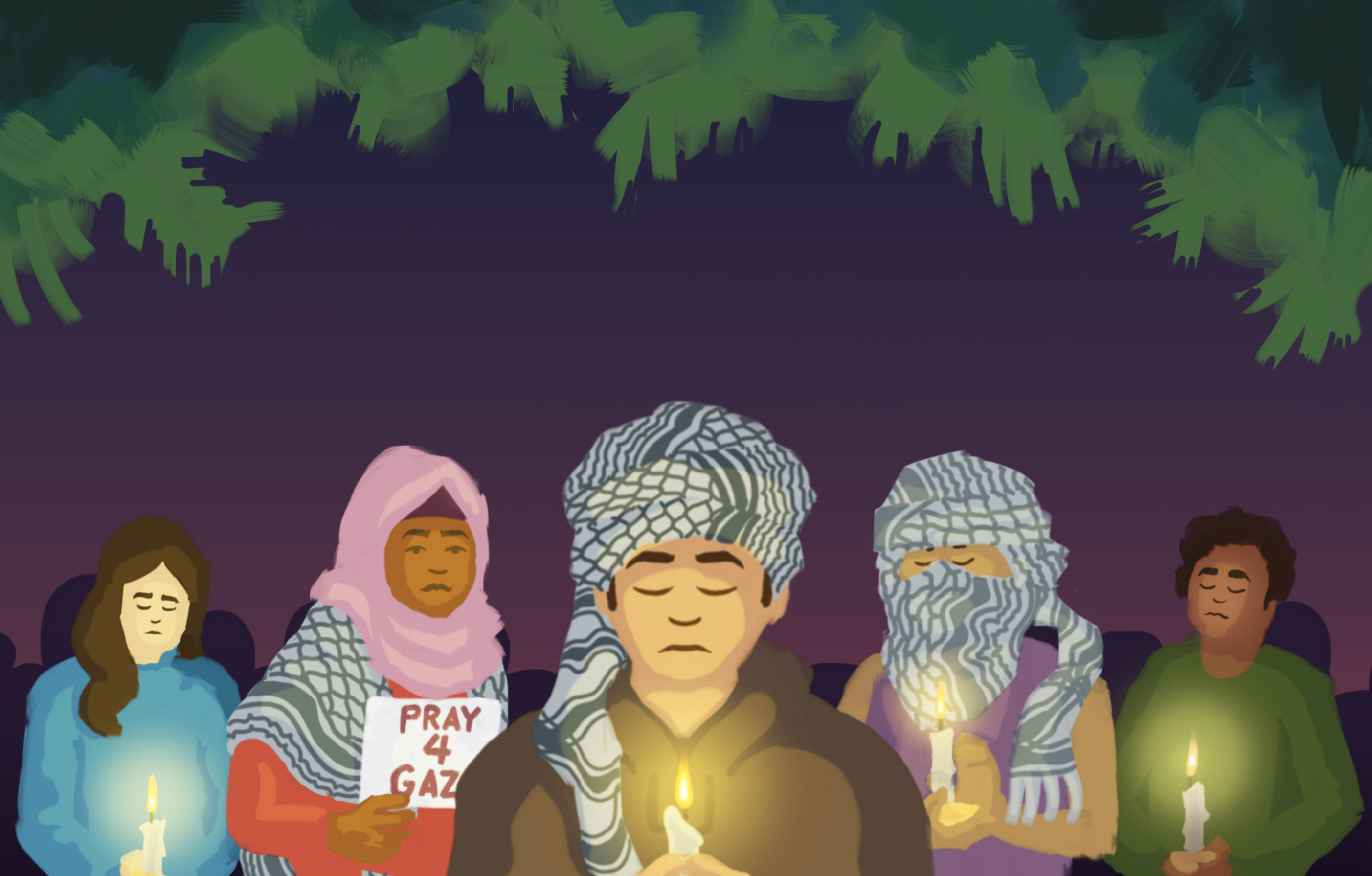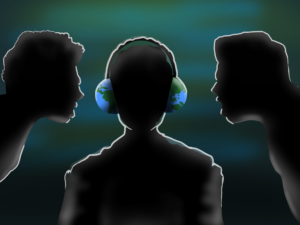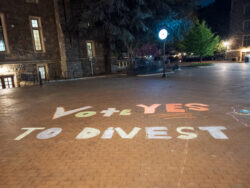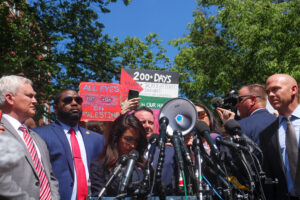Content warning: This article references systemic violence, Islamophobia, and antisemitism.
The editorial board recognizes the escalation of violence in Israel and Palestine has been grievous for Jewish and Palestinian communities. We extend compassion to those in pain. In times of devastation, we must center humanity. Any civilian death—regardless of race, religion, or nationality—is a tragedy.
We condemn Hamas’s attack against Israeli civilians and stand with the Jewish community in their grief. We also condemn Israel’s indiscriminate use of violence—that amounts to collective punishment—against Palestinian civilians. Nevertheless, we must confront our political reality: while the Jewish community’s grief has been weaponized to justify an American-sponsored bombardment of Gaza, the Palestinian community’s grief has been too often stifled and distorted as “sympathizing with terrorism.”
Emboldened by Western support and media complicity, Israel’s genocidal campaign against Palestinians has only intensified. Israel has launched retaliatory airstrikes, cut off all food, water, electricity, and humanitarian aid to Gaza, and airburst white phosphorus projectiles that inflict excruciating burns. On Oct. 13, Israel ordered the immediate—and impossible—evacuation of 1.1 million Gazans, in what the World Health Organization has deemed a death sentence. On Oct. 17, a hospital was bombed, killing at least 500 Palestinians and burying hundreds more under the rubble. Investigations are still ongoing, but Palestinian health officials blame an Israeli airstrike, while Israel has rejected responsibility for the bombing.
Georgetown’s Palestinian community has faced both an absence of support from the administration and hostility from fellow students. President John DeGioia’s Oct. 8 university-wide email was egregiously one-sided in its selective moral outrage, denying that Palestinian lives are as valuable as Israeli lives. While rightfully mourning the 1,400 Israeli deaths from Hamas’s Oct. 7 attack, not once did DeGioia mention the Palestinian deaths at Israel’s hands. With more than 3,478 Palestinians massacred in Gaza as of Oct. 18, Georgetown still hasn’t expressed a word mourning their loss.
When Georgetown students gathered at a vigil to mourn the murder of their loved ones in Palestine, other students heckled, jeered, and recorded them. Students for Justice in Palestine flyers in Red Square, a designated free speech zone, were torn down and shredded after mere hours. Since Hamas’s attack, we have seen a national spike in Islamophobia and anti-Palestinian bigotry.
Highlighting Israel’s oppression of Palestinians shouldn’t be conflated with a justification of Hamas’s attack or antisemitism. In advocating for the Palestinian community, which has faced systematic and institutional erasure, the suffering of the Jewish community shouldn’t be minimized.
The editorial board calls on Georgetown to break its silence on Israel’s violent occupation of Palestine. Because of Georgetown’s negligence, the onus has fallen on students to educate others on the truth of the issue.
DeGioia’s statement fails to make two critical distinctions: first, it doesn’t properly attribute the “unprecedented terrorist attack” to Hamas, and second, it implies these attacks emerged from a vacuum. To the first point, by not clearly distinguishing between Hamas and Palestinians, DeGioia’s statement reinforces Islamophobic stereotypes that Palestinians, who are majority Muslim, are terrorists, legitimizing hate toward the Palestinian community and its allies.
Furthermore, this “conflict” didn’t begin when Hamas attacked Israel. Early Zionist leaders, who openly called Zionism a “colonization adventure,” encouraged Jewish settlement in the area now known as Israel and Palestine. Under the British mandate from 1920 to 1948, British leaders imposed a colonial crackdown on indigenous Palestinians in order to establish settlements for European Jews. The 1947 United Nations (UN) Partition Resolution codified Zionism by enforcing a two-state solution that disproportionately allocated land to Jewish settlers. Simultaneously, Zionists forcibly displaced over 750,000 Palestinians from their homes. In 1967, the state of Israel expanded its borders into UN-recognized Palestinian territory, displacing an additional 300,000 Palestinians.
Today, Israel continues to violate international law. Israel’s current siege on Gaza is a protraction of an indefinite air and sea blockade on Gaza that started in 2007. Israel has routinely subjected Palestinians to unlawful killings, unjust detentions, and severe restrictions on basic freedoms. Amnesty International, Human Rights Watch, and Israeli human rights organization B’Tselem classify Israel as an apartheid regime. Gaza is one of the most densely populated places in the world, with half of its population being children, making this especially heinous.
In addition to being morally reprehensible, Georgetown’s silence on Israel’s oppression of Palestinians is symptomatic of its unfulfilled commitment to a “global perspective.” After Russia invaded Ukraine in 2022, Georgetown mobilized in solidarity with the Ukrainian community through statements, town halls, and engagement events. In stark contrast, administrators have never once addressed its Palestinian community, leaving Palestinian students, faculty, and staff to navigate personal losses without institutional support. On Oct. 16, SFS Dean Joel Hellman sent out an email with academic resources about the Israel-Hamas conflict, but there has been no official condemnation of Israel’s war crimes.
Georgetown’s Jewish chaplaincy also sent out an email in response to Hamas’s attack on Israel. The statement used broad rhetoric about Israel’s “right to defend itself” that has historically been offered as justification for punitive military action against Palestinians. Moreover, it specifically attributed continual Palestinian suffering to “cycles of extremism” and “terror funded by Iran,” echoing right-wing talking points designed to ignore the impact of Israel’s long-standing policy of promoting Hamas to divide Palestinians in Gaza and the West Bank. At a time when many Jews are protesting in solidarity with Palestinians, the Jewish chaplaincy should likewise advocate against the atrocities of Israel’s government.
In regard to communications, we previously suggested that the administration should consult with students, faculty, and staff to agree upon transparent guidelines before issuing statements. Georgetown’s Jewish Voice for Peace chapter’s statement shows that it is entirely possible to condemn Hamas’s attack while still emphasizing the violent reality for Palestinians that many experts have described as ethnic cleansing. With this model in mind, we call on DeGioia to release a revised statement that apologizes for his first statement and acknowledges the humanity of Palestinians.
In Hellman’s words, “these are the moments for which our school was created.” It is past time for Georgetown to end its silence on Israel’s mass killings and apartheid, and to stand in solidarity with the Palestinian community.
Editor’s note: This article was finalized on Oct. 18 and was slated for print distribution on Oct. 20, prior to DeGioia releasing a second statement on Oct. 19. Compared to his first statement, this is an improvement in that it acknowledges the “human dignity” of Palestinians. Nevertheless, the editorial board notes that this is the bare minimum: it took DeGioia almost two weeks—during which time thousands were killed and over one million were displaced in occupied Palestinian territories—to affirm the value of Palestinian lives, and this was only after a meeting with members of the Palestinian, Muslim, and Arab communities on campus. In contrast, DeGioia issued a statement for Jewish communities within a day of Hamas’s attack, similar to the timeline he upheld when offering support to the Ukrainian community after Russia’s invasion. For an institution steeped in Jesuit values such as the sanctity of life, this is shamefully hypocritical and glaringly racist.
While DeGioia highlights “the unconscionable terror committed by Hamas,” he doesn’t mention, much less condemn, any of Israel’s crimes against humanity in Palestine—in his statement, Palestinians “face airstrikes” and “lack access to basic necessities” as though these were happening by an unknown actor. In reality, Israel has dropped more bombs in Gaza—a much smaller and densely populated area—in a week than the US dropped in Afghanistan in a year. Israel’s complete siege on Gaza has also instrumentalized starvation and thirst as a weapon of war. DeGioia’s silence on apartheid, genocide, and ethnic cleansing is unacceptable. Furthermore, DeGioia never once apologizes for the irrevocable harm he inflicted on the Palestinian community with his first statement, as though his words didn’t have material consequences for marginalized communities, including the harassment students faced while they mourned. In this way, he conveniently escapes accountability.
To us, this only proves the deep roots of white supremacy in Georgetown’s leadership, which, time and time again, fails its BIPOC students. That members of Palestinian, Muslim, and Arab communities had to personally arrange to meet with DeGioia to qualify their humanity is abhorrent. Our long-standing call, echoed consistently in our editorials, still stands: Georgetown must do better by its marginalized communities. Georgetown must end its complicity in Israel’s violent occupation of Palestine—and end it now.





The article is full of factual inaccuracies and Hamas propaganda with regards to the history of Israel, it’s creation, and the realities of the Palestinians within the contex of years of terrorism against Israel. Consciously or not, this article is riddled with anti-Semitism. As an alumni, I suggest that the writers be forced to cite their work and prove their accusations in the future. They have selectively linked to outside sources to further their agenda and left areas uncited (the 1967 war, 1947 creation etc) and facts missing, which would paint an entirely different picture.
This story contains the claim, now proven to be false, about the “attack” on the hospital in Gaza. The Voice is spreading disinformation by keeping this article posted as is.
https://www.usatoday.com/story/opinion/2023/10/22/gaza-hospital-explosion-hamas-israel-war-misinformation/71246499007/